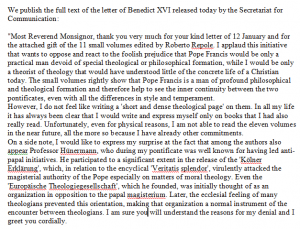Strange Lent 2018. The Vatican had to admit to Associated Press this week, that the Holy See has manipulated a photograph of a letter from Benedict XVI, in which the Pope Emeritus apparently praised Pope Francis’s collected writings. It had blurred the two final lines of the first page where Benedict explains that he hasn’t actually read the books in question and cannot contribute a theological assessment of Francis’s writings as requested. It is difficult to avoid the impression, that Pope emeritus Benedict XVI. was used to advertise for Pope Francis. Pope Francis warned us in January that Fake news is dangerous because it uses ‘distorted data’ to manipulate the public, and even his Lent message 2018 is about snake salesmen. Well, true.
I translated the letter letter from Benedict XVI from Italian into English. For a man like Benedict the XVI with such a subtle command of language, this is a rather harsh rejection of Pope Francis’ work, at times double edged if not downright sarcastic.
For there is nothing hidden that will not be disclosed, and nothing concealed that will not be known or brought out into the open. Luke 8:17
MESSAGE OF HIS HOLINESS BENEDICT XVI FOR LENT 2010
What is the Cause of Injustice?
The Evangelist Mark reports the following words of Jesus, which are inserted within the debate at that time regarding what is pure and impure: “There is nothing outside a man which by going into him can defile him; but the things which come out of a man are what defile him … What comes out of a man is what defiles a man. For from within, out of the heart of man, come evil thoughts” (Mk 7, 14-15, 20-21). Beyond the immediate question concerning food, we can detect in the reaction of the Pharisees a permanent temptation within man: to situate the origin of evil in an exterior cause. Many modern ideologies deep down have this presupposition: since injustice comes “from outside,” in order for justice to reign, it is sufficient to remove the exterior causes that prevent it being achieved. This way of thinking – Jesus warns – is ingenuous and shortsighted. Injustice, the fruit of evil, does not have exclusively external roots; its origin lies in the human heart, where the seeds are found of a mysterious cooperation with evil. With bitterness the Psalmist recognises this: “Behold, I was brought forth in iniquity, and in sin did my mother conceive me” (Ps 51,7). Indeed, man is weakened by an intense influence, which wounds his capacity to enter into communion with the other. By nature, he is open to sharing freely, but he finds in his being a strange force of gravity that makes him turn in and affirm himself above and against others: this is egoism, the result of original sin. Adam and Eve, seduced by Satan’s lie, snatching the mysterious fruit against the divine command, replaced the logic of trusting in Love with that of suspicion and competition; the logic of receiving and trustfully expecting from the Other with anxiously seizing and doing on one’s own (cf. Gn 3, 1-6), experiencing, as a consequence, a sense of disquiet and uncertainty. How can man free himself from this selfish influence and open himself to love?


